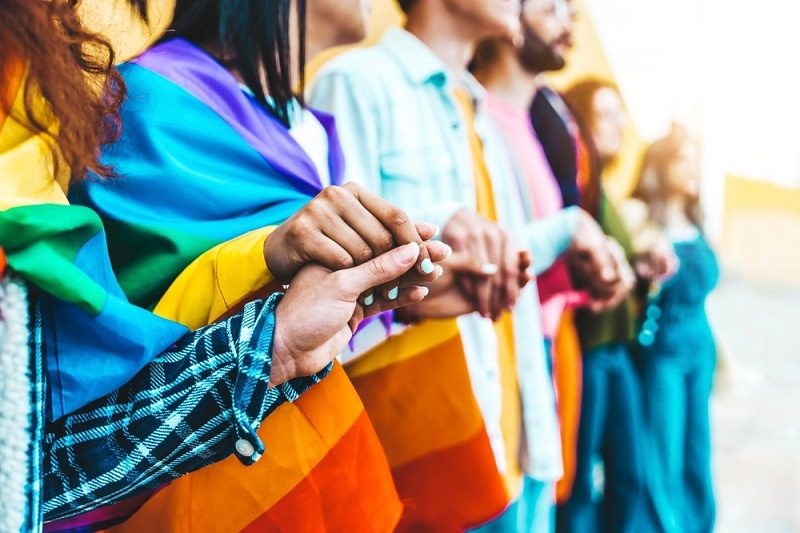Unconditional Acceptance: Celebrating LGBTQ Child's Identity

Its a critical moment in the life of any parent: when your child reveals to you their identity as a member of the LGBTQ community. As a parent, you want to process the news with love and open-mindedness, but you may be uncertain of how to do just that. The good news is that unconditional acceptance is possible, and its essential for your childs growth and wellbeing. Heres how to celebrate your LGBTQ child's identity and growth.
Acknowledge and Accept Your Own Emotions
The initial reaction to news of a childs LGBTQ identity can be a mixture of emotions, ranging from surprise to fear, anger, or even shock. Its important to take a few moments to acknowledge and accept your own feelings, while being mindful of the fact that they dont necessarily reflect your childs truth. As an adult, its essential to recognize that your emotions may be in transition, and that its ok to take the time to process them.
The best way to do this is to find a safe space to express your emotions, whether that be with a friend, a trusted family member, or a mental health professional. Taking the time to work through your own emotional responses can help you to move forward in a positive and affirming way.
Show Unconditional Love

When it comes to your LGBTQ youth or child, its essential to show them, unconditional love, no matter what. This means that you accept them as they are and love them no matter what their identity is. This is especially important for LGBTQ youth, who may be feeling vulnerable and uncertain of their place in the world. Showing your love and support can make a huge difference in their overall well-being.
One way to show your unconditional love is to tell your child that you love them and that you will always be there for them. Its also important to be willing to listen to their thoughts and feelings, without judgment. Creating a safe and open space for dialogue can help you to better understand your childs identity and experience.
Educate Yourself About the Community
Its important to educate yourself about the LGBTQ community and the experiences of LGBTQ youth. This can involve reading books, watching films, attending events, and connecting with other LGBTQ parents and allies. Its also important to be mindful of the language you use when talking about your childs identity and to avoid assumptions.
By educating yourself, you can gain a better understanding of the LGBTQ experience and create a more supportive environment for your child. You may also find that you have more questions and thats ok. There is no one-size-fits-all approach and each child is unique.
Get Required Support
Parenting an LGBTQ child can be a challenging experience, so its important to get the support you need. This can involve talking to other parents of LGBTQ children, connecting with LGBTQ organizations, or seeking professional counseling. Its also important to prioritize self-care and to take care of your own mental health.
By getting the support you need, you can better understand and support your child. This can involve talking to them about their experiences, being open to learning, and offering your love and support.
Create an Inclusive Environment
Creating an inclusive environment is essential for your childs well-being. This can involve talking to family members, friends, and school administrators about your childs identity and asking them to respect and honor it. Its also important to be mindful of the language you use and to make sure that it is respectful and affirming.
Its also important to be aware of any discriminatory policies or laws that may be in place. This can involve researching your states laws, advocating for change, and supporting your child in any way you can.
Advocate for Your Child
As a parent, its your responsibility to advocate for your child. This can involve talking to school administrators, advocating for change in your states laws, and speaking out against discrimination. Its also important to be aware of any potential safety risks and to protect your childs safety and well-being.
By advocating for your child, you can help to create a more inclusive and supportive environment. This can involve speaking up when you see or hear discrimination, talking to school staff about creating an inclusive environment and participating in LGBTQ events and organizations.
Celebrate Your Childs Identity
Celebrating your childs identity is essential for their growth and development. This can involve talking openly and honestly about your childs identity, being mindful of the language you use, and embracing the diversity of the LGBTQ community. Its also important to be open to learning about different identities and to be willing to ask questions.
Additionally, its important to celebrate your childs milestones and achievements. This can involve attending Pride events, going to performances, and supporting their interests and hobbies. By celebrating your childs identity, you can show them that you accept and support them.
Get Involved in the Community

Getting involved in the LGBTQ community is a great way to show your support for your child and to create an inclusive environment. This can involve attending events such as queer pride festivals, joining organizations, and connecting with other parents of LGBTQ children. Its also important to stay up-to-date on current events and to be aware of any changes in laws or policies.
By getting involved, you can create a more supportive and affirming environment for your child. This can involve advocating for change, speaking out against discrimination, and standing up for the rights of LGBTQ individuals.
Respect Your Childs Privacy
Its important to respect your childs privacy and to be aware of any potential safety risks. This can involve being mindful of what you share on social media, not forcing your child to come out, and avoiding any assumptions or questions about their identity.
Additionally, its important to be aware of any potential discrimination or bullying. This can involve talking to your child about any potential risks, teaching them about their rights, and providing them with the resources and support they need.
Conclusion
Discussing gender identity can be a difficult but essential part of parenting an LGBTQ child. This can involve talking to your child about their identity, being open to learning, and avoiding assumptions. Its also important to be mindful of the language you use and to be respectful of your childs decisions.
By discussing gender identity, you can create a safe and open environment for your child to explore their identity and learn more about themselves. This can involve talking to them about their experiences, being open to their thoughts and feelings, and offering your support.























